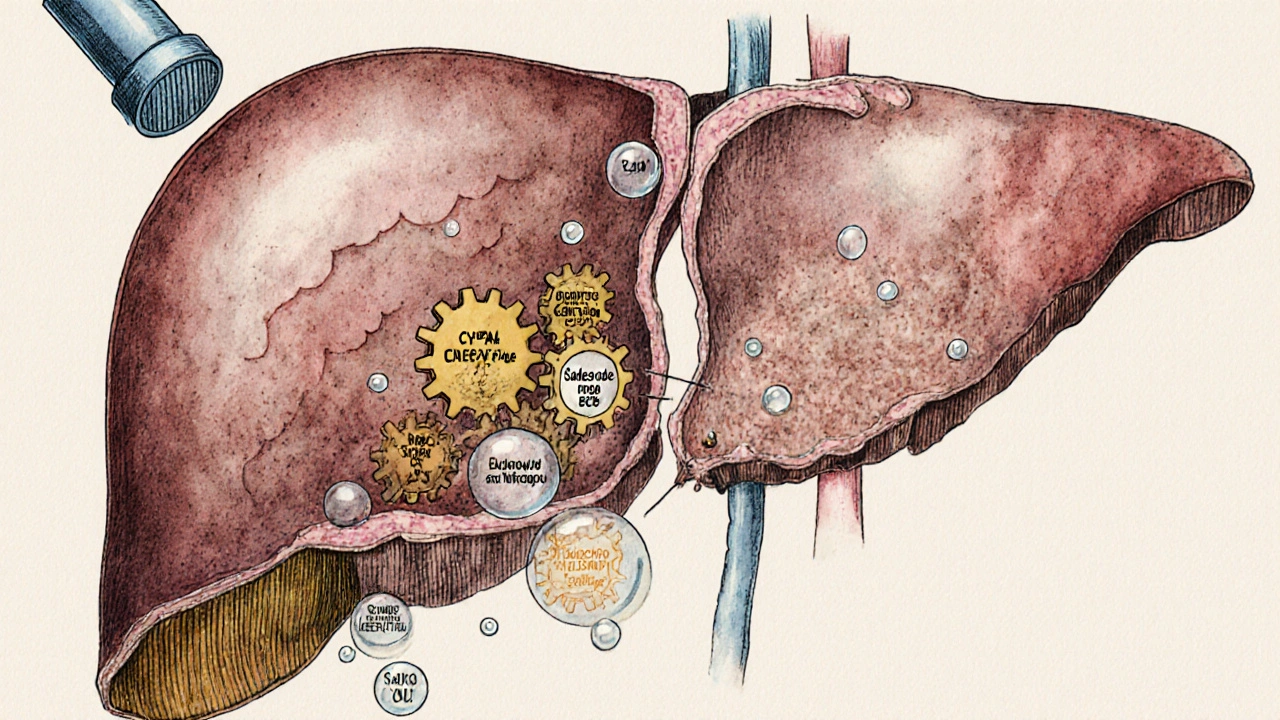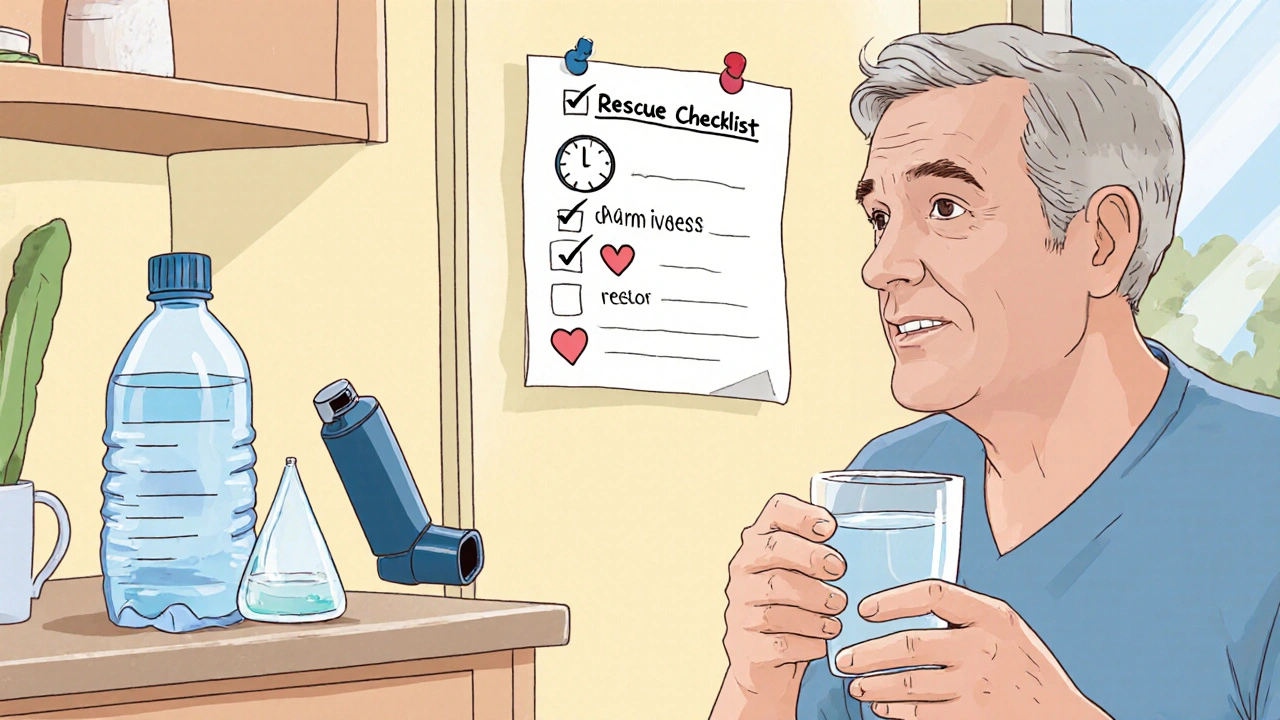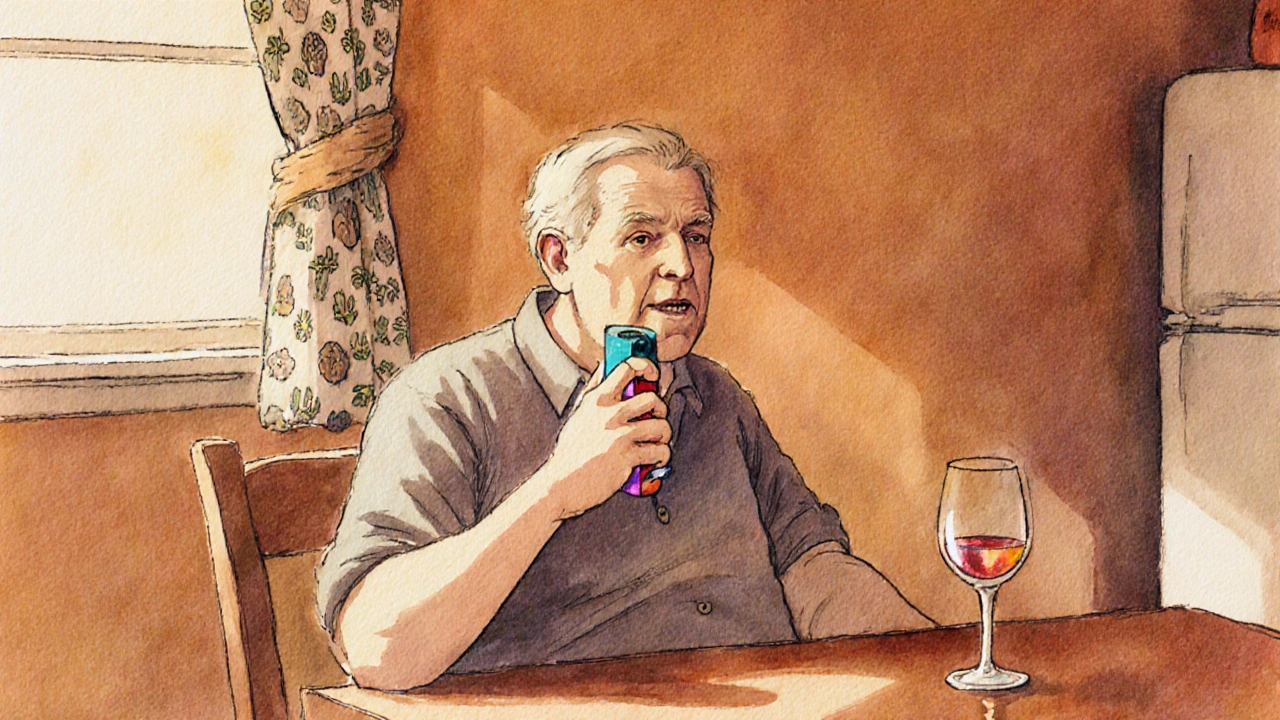- 14
Alcohol & Budesonide/Formoterol Risk Calculator
How Alcohol Affects Your Inhaler
This calculator estimates your risk level based on alcohol consumption and health factors. For safety, always consult your doctor before drinking.
Enter your information to see your personalized risk level.
Mixing Budesonide/Formoterol is a popular combination inhaler used for asthma and COPD, and alcohol is enjoyed socially worldwide. When you bring them together, the interaction isn’t always obvious, but it can affect how well your lungs stay open and how your body handles side‑effects. Below you’ll find a straight‑to‑the‑point guide that answers the key safety questions.
What Exactly Is Budesonide/Formoterol?
Budesonide/Formoterol combines an inhaled corticosteroid (ICS) with a long‑acting beta‑agonist (LABA) in a single inhaler. The corticosteroid part, budesonide, reduces airway inflammation. The bronchodilator part, formoterol, relaxes smooth muscle to keep airways open for up to 12 hours. Brands like Symbicort package both drugs, offering convenient twice‑daily dosing for asthma and COPD patients.
How Does Alcohol Work in the Body?
When you drink, ethanol is absorbed quickly through the stomach and small intestine, then metabolized mainly in the liver by the enzyme CYP3A4. The liver converts ethanol to acetaldehyde, then to acetate, releasing energy and, at higher levels, causing sedation, vasodilation, and impaired coordination.
Why Might Alcohol Matter for Budesonide/Formoterol?
The two drugs don’t directly clash like a classic drug‑drug interaction, but alcohol can influence the *pharmacokinetics* and *pharmacodynamics* of the inhaler in three ways:
- Enzyme competition: Both formoterol and budesonide are partially metabolized by CYP3A4. Heavy drinking can temporarily saturate the enzyme, leading to slightly higher systemic levels of the inhaled drugs.
- Respiratory effects: Alcohol causes mild bronchodilation followed by reflex bronchoconstriction as the body compensates. This can mask the true effectiveness of your inhaler or trigger an unexpected wheeze.
- Systemic side‑effects: Sedation and vasodilation from alcohol can amplify the heart‑rate‑raising (tachycardia) or blood‑pressure‑lowering (hypotension) effects that some patients experience from formoterol.
These mechanisms don’t turn Budesonide/Formoterol into a poison, but they raise the odds of feeling “off” after a night out.

Clinical Risks You Should Watch For
Below is a quick‑look table that sums up the most common issues reported in clinical studies and real‑world case series (e.g., 2023 JACI data on inhaled steroid‑alcohol interactions).
| Effect | Likelihood | Typical Severity | Practical Recommendation |
|---|---|---|---|
| Increased systemic corticosteroid exposure | Low (moderate drinking) | Mild-possible temporary immune suppression | Limit alcohol to one drink per day; avoid binge drinking. |
| Tachycardia or palpitations | Moderate (2-3 drinks) | Variable-occasionally uncomfortable | Stay hydrated; monitor pulse for >100 bpm. |
| Hypotension or dizziness | Low‑moderate | Usually mild, can cause falls | Sit or lie down before standing; avoid driving if dizzy. |
| Reduced perception of asthma symptoms | High (any alcohol) | Can delay rescue inhaler use | Keep a short‑acting bronchodilator (SABA) on hand. |
| Worsened nocturnal cough | Low‑moderate | Disrupts sleep quality | Avoid alcohol within 4 hours of bedtime. |
Most of these effects are reversible, but they can become serious if you combine heavy drinking with a high dose of the inhaler or have pre‑existing heart conditions.
How to Use Budesonide/Formoterol Safely Around Alcohol
Here’s a practical checklist you can keep on your fridge or phone:
- Know your dose. Typical maintenance is two inhalations (one per actuation) twice a day. If you’ve been instructed to use a higher rescue dose, be extra cautious.
- Limit intake. For most adults, ≤1 standard drink per day (≈14 g ethanol) is unlikely to cause noticeable interactions.
- Space timing. Take your inhaler at least 30 minutes before drinking, giving the medication time to settle in the lungs.
- Monitor symptoms. Keep a simple log: note heart rate, blood pressure (if you have a home cuff), and any wheeze after drinking.
- Carry a rescue inhaler. A short‑acting beta‑agonist (SABA) like albuterol can counteract unexpected bronchoconstriction.
- Stay hydrated. Water helps metabolize alcohol faster and reduces the risk of dizziness.
- Talk to your prescriber. If you have a history of cardiac arrhythmia, liver disease, or are on other CYP3A4‑metabolized meds, ask for personalized advice.
These steps work for both asthma and COPD patients, but the tolerance window is usually tighter for COPD because the lungs are already compromised.
Special Populations
Older adults often have reduced liver function, so even a single drink can raise systemic drug levels. Consider limiting alcohol to occasional occasions only.
Pregnant or breastfeeding women should generally avoid alcohol, not only for the infant but also because hormonal changes can alter airway reactivity, making the inhaler less predictable.
Patients with liver disease (e.g., hepatitis C, fatty liver) should treat any alcohol consumption as a red flag. Their CYP3A4 capacity is already impaired, increasing the chance of systemic steroid excess.

When to Seek Medical Help
If you notice any of the following after drinking while on Budesonide/Formoterol, call your doctor or head to the ER:
- Persistent heart rate >120 bpm.
- Sudden severe shortness of breath that doesn’t improve with your rescue inhaler.
- Unexplained swelling of the face, lips, or tongue (possible allergic reaction).
- Confusion or difficulty staying awake.
These signs suggest the interaction is tipping into a dangerous zone.
Key Takeaways
- Moderate alcohol (≤1 drink) is unlikely to cause major problems, but binge drinking can raise systemic levels of budesonide and formoterol.
- Watch for heart‑rate spikes, low blood pressure, and masked asthma symptoms after drinking.
- Follow the checklist: space timing, stay hydrated, keep a rescue inhaler, and log any changes.
- Older adults, pregnant people, and those with liver disease should be especially cautious.
- Seek medical attention if you experience rapid heart rate, severe breathlessness, or confusion.
Frequently Asked Questions
Can I have a glass of wine with my inhaler?
One standard glass (≈5 oz) is generally safe if you take your inhaler at least 30 minutes beforehand and you don’t have liver or heart issues. Stick to the low‑moderate amount and monitor how you feel.
Does alcohol reduce the effectiveness of the inhaler?
Alcohol can cause temporary bronchodilation followed by reflex narrowing, which may make you think the inhaler isn’t working. Your lung function itself isn’t damaged, but the symptom perception can be dulled, leading to delayed rescue use.
Is it okay to binge drink on weekends?
Binge drinking (≥4 drinks in a short period) can overload CYP3A4, raise systemic steroid levels, and increase heart‑rate side‑effects. It’s best to avoid binge patterns if you rely on Budesonide/Formoterol for daily control.
Do I need to stop the inhaler before surgery involving anesthesia?
Most surgeons advise continuing the maintenance inhaler up to the day of surgery, but you should discuss any planned alcohol consumption with the anesthesiologist because both alcohol and the LABA can affect airway tone under anesthesia.
What are signs of an overdose caused by alcohol‑drug interaction?
Symptoms include unusually fast heart rate, severe dizziness, fainting, or a sudden worsening of asthma that doesn’t respond to rescue medication. If any appear, get medical help immediately.


Maridel Frey
October 19, 2025 AT 12:33When you’re managing Budesonide/Formoterol, the first thing to remember is that timing matters. Taking the inhaler at least half an hour before you start drinking gives the medication a chance to reach the lungs and limits systemic absorption. Keep your alcohol intake to one standard drink per day; this aligns with most clinical guidelines and reduces the risk of tachycardia or mild immune suppression. Hydration is another simple but effective strategy – water helps the liver clear ethanol faster and stabilises blood pressure. Finally, maintain a brief log of your pulse and any wheeze after an evening out; spotting a pattern early lets you and your clinician adjust the regimen before complications arise.
Sarah Unrath
October 23, 2025 AT 00:33its ok just dont overdo the drinks
James Dean
October 26, 2025 AT 11:33the interaction between a LABA and ethanol is subtle enough that many people never notice it unless they keep a mental note of their vitals. if you sip a couple of beers you might feel a slight rush of heart rate, but it usually settles when the alcohol wears off. the key is consistency – drink the same amount each time you use the inhaler and you’ll be able to tell if something is off. also, remember that the bronchodilating effect of alcohol can mask the early signs of an asthma flare, so keep that rescue inhaler handy. in my experience, a simple daily pulse check on a smartwatch does the trick. just stay aware and you’ll avoid the nasty surprises.
Monika Bozkurt
October 29, 2025 AT 23:33as the literature indicates, CYP3A4-mediated clearance of both budesonide and formoterol can be transiently inhibited by ethanol, leading to a marginal increase in systemic exposure. this pharmacokinetic nuance is particularly relevant for patients with hepatic impairment, where enzymatic capacity is already compromised. consequently, a prudent approach involves limiting ethanol consumption to ≤1 standard drink and monitoring plasma cortisol levels in high‑risk cohorts. additionally, adherence to the 30‑minute pre‑drinking interval optimises pulmonary deposition while minimising systemic spill‑over. integrating these evidence‑based measures into routine self‑management plans enhances therapeutic safety.
parth gajjar
November 2, 2025 AT 11:33There is a certain tragic poetry in the way a humble inhaler meets a glass of wine under the dim lights of a Friday evening. The bronchodilator whispers promises of open airways while the alcohol swirls in, a silent conspirator. As the molecules intertwine, the liver, that weary gatekeeper, strains under the dual burden of metabolising ethanol and formoterol. The CYP3A4 enzymes, those unsung heroes, falter, allowing a whisper of excess steroid to seep into the bloodstream. One might feel a fleeting surge of freedom, a false sense of invincibility as the heart quickens its rhythm. Yet, beneath that veneer lies a tremor, a subtle tremulousness that can betray you in the dark. The blood pressure may dip, the world tilting ever so slightly as vasodilation takes hold. In those moments, the inhaler’s intended wonder is eclipsed by the chaos of a body caught between two opposing forces. The cough that follows is not merely a symptom but a lamentation of compromised airway reflexes. Even the nocturnal quiet is disturbed, an echo of the earlier excess that lingers into the night. The next morning, the after‑effects manifest as a lingering fatigue, a reminder that the balance was disturbed. For patients with vulnerable lungs, each sip becomes a gamble with oxygen itself. The narrative of safety is not written in grand gestures but in the tiny choices of timing and dosage. Respect the 30‑minute sanctuary before alcohol touches your lips, and you preserve the inhaler’s purpose. Hydration, that simple ally, can temper the ethanol’s assault on the system. In the end, the story is yours to script, a tale of measured indulgence versus reckless abandon.
Jameson The Owl
November 5, 2025 AT 23:33What the pharmaceutical giants don’t tell you is that they designed these inhalers to be delicate, just fragile enough that a night of binge drinking throws the whole system off balance and drives patients back to the clinic where they can line their pockets. The data they released about CYP3A4 competition is deliberately vague, a smokescreen that hides the true magnitude of the risk. You see the warning labels about “moderate alcohol consumption,” but the fine print is a relic of corporate negotiations, not solid science. By downplaying the interaction they ensure a constant stream of prescriptions and follow‑up visits, keeping the profit cycle humming. It’s not a coincidence that the studies cited are funded by the same companies that sell Symbicort. Take the warning about “one drink per day” with a grain of salt – it’s a compromise that protects market share, not your health. The real solution lies in transparency and patient empowerment, not in the glossy brochures that accompany the inhaler. When you choose to limit your alcohol intake, you’re not just protecting yourself, you’re pushing back against a system that thrives on ambiguity and dependence.
Rakhi Kasana
November 9, 2025 AT 11:33The guidelines are clear – binge drinking with a LABA is a recipe for trouble. Moderation is the safest path.
Sunil Yathakula
November 12, 2025 AT 23:33hey buddy i totally get u feeling that worry after a night out its super common but u can totally manage it by keeping that rescue inhaler in your pocket and staying hydrated it’ll make a big diff keep up the good work
Christian Georg
November 16, 2025 AT 11:33Here’s a quick cheat‑sheet you can paste on your phone:
• Inhaler 30 min before any alcohol
• ≤ 1 standard drink if you’re on maintenance therapy
• Log heart rate after a night out – above 100 bpm warrants a check‑in 😊
• Keep albuterol on hand for unexpected bronchoconstriction
Sticking to these steps makes the whole process painless and keeps your lungs happy.
Latasha Becker
November 19, 2025 AT 23:33Actually the “≤ 1 drink” rule is overly cautious and not backed by robust trials.
Madhav Dasari
November 23, 2025 AT 11:33Yo folks, think of your inhaler like a trusty sidekick and alcohol as the mischievous side‑character that tries to steal the spotlight. If you let it win, you might end up missing the cue for your rescue inhaler, and that’s a plot twist nobody wants. Keep the sidekick pre‑loaded 30 minutes before the party starts, then let the mischief stay in the background. A splash of water between drinks does wonders – it keeps the liver from getting overwhelmed and the heart from doing a rave. Remember, you’re the director of this story, so give your lungs the starring role.
DHARMENDER BHATHAVAR
November 26, 2025 AT 23:33Adhering to the pre‑drinking interval and limiting intake are essential for maintaining therapeutic efficacy.
Kevin Sheehan
November 30, 2025 AT 11:33The interplay of chemistry and choice reflects a deeper truth: we are constantly negotiating between freedom and restraint. Alcohol offers fleeting liberty, yet the inhaler reminds us of the boundaries we must honor for health. Recognising that balance is not a surrender but an act of self‑respect empowers us to enjoy life without compromising safety. When the heart races unexpectedly, it signals that the scales have tipped, urging a pause. By listening to those signals we cultivate a wiser relationship with both medicine and merriment.
Jay Kay
December 3, 2025 AT 23:33Bottom line: don’t mix heavy drinking with your inhaler or you’ll pay the price.